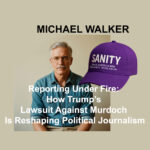Reporting Under Fire: How Trump’s Lawsuit Against Murdoch Is Reshaping Political Journalism
On
- Commentary, Politics

/
RSS Feed
The most recent development in the lawsuit filed by President Donald Trump against Rupert Murdoch, The Wall Street Journal, and its parent companies, Dow Jones and News Corp, occurred in July 2025. Trump initiated a $10 billion defamation lawsuit in the Southern District of Florida federal court on July 18, 2025, following a Wall Street Journal article published the previous day. The article alleged that Trump sent a “bawdy” birthday letter and a sexually suggestive drawing to Jeffrey Epstein for his 50th birthday in 2003. Trump denies the authenticity of the letter, calling it “fake” and claiming it does not reflect his writing style or behavior, and accuses the defendants of acting with malicious intent to harm his reputation.
The lawsuit names Murdoch, News Corp CEO Robert Thomson, and reporters Khadeeja Safdar and Joe Palazzolo as defendants, alleging libel and slander. Trump’s legal action followed his direct warnings to Murdoch and the Journal’s editor, Emma Tucker, against publishing the story, which he claims they ignored. The Wall Street Journal and Dow Jones have stated they stand by their reporting and will vigorously defend against the lawsuit.
The case has been assigned to U.S. District Judge Darrin Gayles, who previously handled a 2023 lawsuit Trump filed against his former lawyer Michael Cohen, which Trump dropped before a scheduled deposition. Legal experts have expressed skepticism about the lawsuit’s merits, noting that Trump must prove “actual malice” to succeed in a defamation case, and the $10 billion damages sought are considered unusually high and potentially unrealistic.
The lawsuit has strained the long-standing, complex relationship between Trump and Murdoch, a media mogul whose outlets, including Fox News, have historically supported Trump but have also faced his criticism. Some reports suggest the suit serves as a warning to other media outlets, raising concerns about press freedom. There are no updates beyond July 2025 indicating further court proceedings or resolutions as of my last available information.
This isn’t just a defamation suit—it’s a tactic. Trump’s lawsuit is part of a larger pattern in which journalism isn’t merely questioned, but threatened—by legal firepower intended to force editorial compliance, intimidate sources, and discourage scrutiny. It tests whether a free press can operate freely when powerful political figures use litigation to police narrative boundaries.
1. Weaponizing Lawsuits to Regulate Truth
Trump’s case isn’t likely to succeed on legal grounds—New York Times v. Sullivan sets a high bar for defamation. But that may not be the point.
Like SLAPP suits (Strategic Lawsuits Against Public Participation), this action imposes financial and legal burdens meant to:
-
Stall or chill investigative reporting
-
Shift editorial policies toward “safer,” less critical ground
-
Force outlets to weigh the legal cost of “getting it wrong” against journalistic boldness
What this implies:
A political figure can regulate journalism not with laws, but with lawyers.
2. Political Oversight Through Fear, Not Policy
Unlike traditional government censorship or regulatory control, this is oversight through intimidation:
-
Editors become risk managers
-
Reporters self-censor to avoid being the next target
-
Media companies weigh “is it worth it?” instead of “is it true?”
This form of “soft censorship” doesn’t require legislation—it requires deep pockets, loyal followers, and a willingness to attack institutions.
3. Eroding the Public’s Trust by Destabilizing the Source
When Trump sues The Wall Street Journal, it’s not just about setting the record straight. It’s a message to his base:
“Even your trusted conservative outlets are lying—only I speak the truth.”
This isolates his followers from any independent source of verification—making journalism itself the enemy.
The result?
-
Loyalty trumps objectivity
-
Tribal narratives override shared facts
-
Journalism is seen as either “ours” or “theirs”
4. The Long-Term Cost: Press as Political Risk, Not Public Service
The chilling effect doesn’t stop at WSJ. Smaller outlets, freelance journalists, even whistleblowers see what happens when you challenge political power with inconvenient facts.
If the new precedent is:
-
“Report on power at your own risk,”
then journalism is no longer a civic tool—it’s a liability.


Comments are Disabled